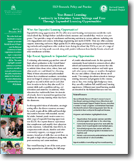The Harvard Family Research Project separated from the Harvard Graduate School of Education to become the Global Family Research Project as of January 1, 2017. It is no longer affiliated with Harvard University.

|
December 2012 Year-Round Learning: Continuity in Education Across Settings and Time Through Expanded Learning OpportunitiesErin Harris, Ashley Wallace Download a PDF of this publication (146 kb) | View all publications in this series |
Article Information
- Full Text (HTML)
- Full Text (PDF: 146 kb)
Year-round learning is one of the most promising approaches to addressing the full range of youth’s educational needs. In this approach, community-based initiatives connect school, afterschool, and summer learning to ensure that educational opportunities reinforce and build upon each other across settings, are seamless throughout the year, and address a broad and diverse set of needs.
In Year-Round Learning: Continuity in Education Across Settings and Time Through Expanded Learning, the third brief in our series with the National Conference of State Legislatures, we explore four benefits of year-round learning. In particular, continuity across time and settings allows:
- Shared resources among educational partners,
- Family and youth engagement in learning,
- Prevention of summer learning loss, and
- Coordinated systems to track and use data.
This brief provides examples of year-round learning programs along with the following recommendations for policymakers looking for ways to increase youth engagement in learning.
Policymakers can help year-round learning efforts by:
- Supporting flexible funding initiatives to cover year-round learning strategies as a whole, rather than funding them individually.
- Looking for ways to combine state money with funds from various other sources, which can help maximize use of public money for youth programs.
- Considering policies that encourage schools and parents to work with summer and afterschool programs to tailor programming to youth’s interests and needs.
- Taking into account the impact of summer learning loss on the achievement gap and the role summer programs can play in minimizing that loss.
- Finding ways that schools, parents, agencies, and community partners can share student information in a secure manner.
Free. Available online only.

